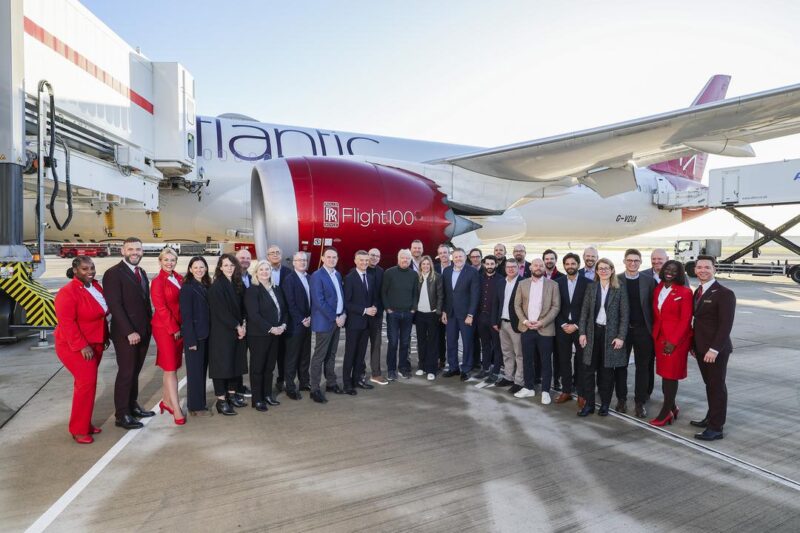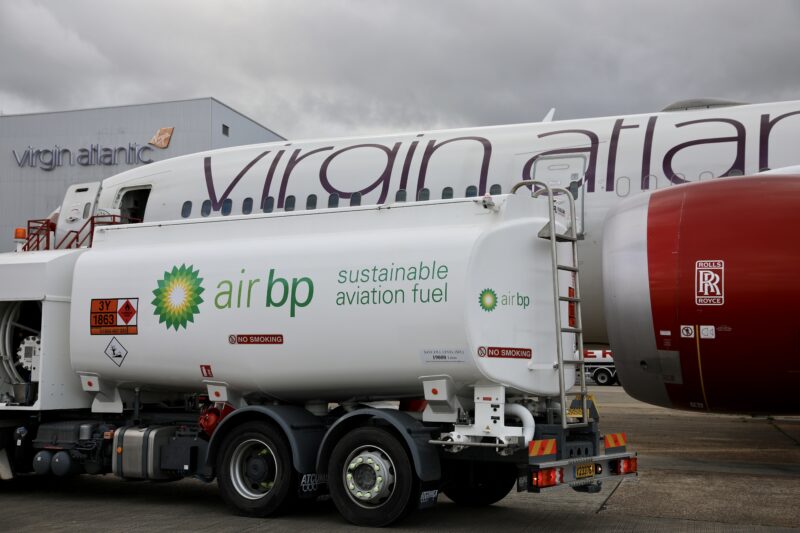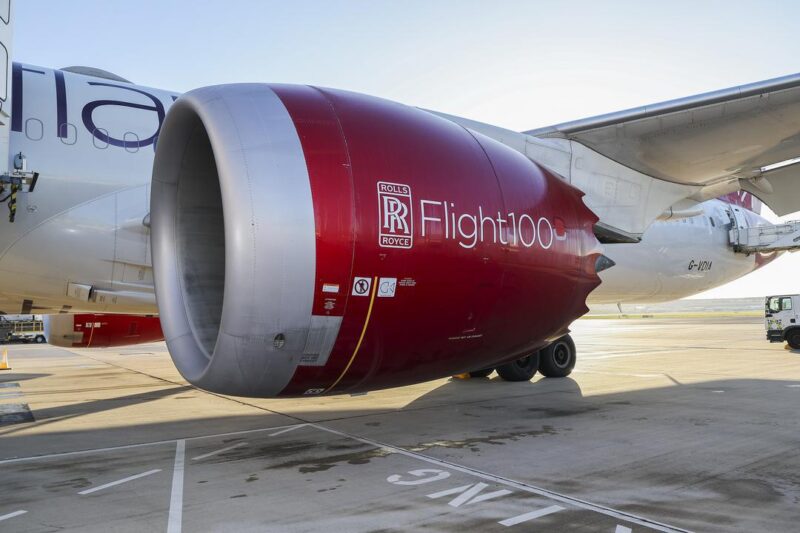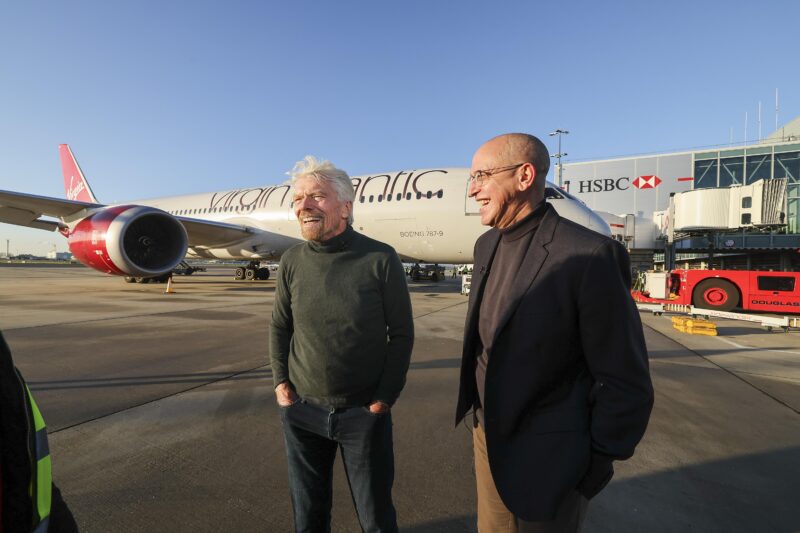It seems Virgin Atlantic, along with its partners has taken to the air with its 100% Sustainable Air Fuel-fueled flight.
The flight marks a world first on 100% Sustainable Air Fuel (SAF) by a commercial airline across the Atlantic, flown on a Boeing 787, using Rolls-Royce Trent 1000 engines.
To get to this milestone, a consortium of partners worked together in Boeing, Rolls-Royce, Imperial College London, University of Sheffield, ICF and Rocky Mountain Institute, in partnership with the Department for Transport.
The idea behind the flight is to market and demonstrate the capability of SAF as a safe drop-in replacement for fossil-derived jet fuel, compatible with today’s engines, airframes and fuel infrastructure on a transatlantic flight between London Heathrow and New York JFK.
As well as proving the capabilities of SAF, Flight100 will assess how its use affects the flight’s non-carbon emissions with the support of consortium partners ICF, Rocky Mountain Institute (RMI), Imperial College London and the University of Sheffield. The research will improve scientific understanding of the effects of SAF on contrails and particulates and help to implement contrail forecasts in the flight planning process. Data and research will be shared with industry, and Virgin Atlantic will continue its involvement with contrail work through RMI’s Climate Impact Task Force, which is part-funded by Virgin Unite.
A drop-in replacement
As we head towards the Net Zero 2050 plans, airlines are scrambling for a replacement technology that is carbon-neutral. Whilst there is work in the pipeline for electric and hydrogen-powered aviation, the commercial realisation of these technologies is going to take a lot of time – especially in long-haul markets.
SAF – made from made from waste products, delivers CO2 lifecycle emissions savings of up to 70%, whilst performing like the traditional jet fuel it replaces and can be used as a drop-in replacement
The SAF used on Flight100 is a unique dual blend; 88% HEFA (Hydroprocessed Esters and Fatty Acids) supplied by AirBP and 12% SAK (Synthetic Aromatic Kerosene) supplied by Virent, a subsidiary of Marathon Petroleum Corporation. The HEFA is made from waste fats while the SAK is made from plant sugars, with the remainder of plant proteins, oil and fibres continuing into the food chain. SAK is needed in 100% SAF blends to give the fuel the required aromatics for engine function.
The Supply Problem and Virgin’s Solution
SAF has a big problem – and it’s down to supply. SAF represents less than 0.1% of global jet fuel volumes – mere drops in a kerosene ocean. In addition, the feedstocks to head towards a long-term sustainable SAF pipeline are… lacking.
Virgin Atlantic calls for innovation and investment needed across all available feedstocks and technologies must be harnessed to maximise SAF volumes as well as continue the research and development needed to bring new zero-emission aircraft to market.
They go on to say that Flight100 will prove that the challenge of scaling up production is one of policy and investment, and industry and government must move quickly to create a thriving UK SAF industry.
In Quotes
Shai Weiss, Chief Executive Officer, Virgin Atlantic said:
“Flight100 proves that Sustainable Aviation Fuel can be used as a safe, drop-in replacement for fossil-derived jet fuel and it’s the only viable solution for decarbonising long haul aviation. It’s taken radical collaboration to get here and we’re proud to have reached this important milestone, but we need to push further. There’s simply not enough SAF and it’s clear that in order to reach production at scale, we need to see significantly more investment. This will only happen when regulatory certainty and price support mechanisms, backed by Government, are in place. Flight100 proves that if you make it, we’ll fly it.”
Sir Richard Branson, Founder, Virgin Atlantic said:
“The world will always assume something can’t be done, until you do it. The spirit of innovation is getting out there and trying to prove that we can do things better for everyone’s benefit.
“Virgin Atlantic has been challenging the status quo and pushing the aviation industry to never settle and do better since 1984. Fast forward nearly 40 years, that pioneering spirit continues to be Virgin Atlantic’s beating heart as it pushes the boundaries from carbon fibre aircraft and fleet upgrades to sustainable fuels.
“I couldn’t be prouder to be onboard Flight100 today alongside the teams at Virgin Atlantic and our partners, which have been working together to set the flight path for the decarbonisation of long-haul aviation.”
Transport Secretary Mark Harper said:
“Today’s historic flight, powered by 100% sustainable aviation fuel, shows how we can both decarbonise transport and enable passengers to keep flying when and where they want.
“This Government has backed today’s flight to take-off and we will continue to support the UK’s emerging SAF industry as it creates jobs, grows the economy and gets us to Jet Zero.”
Sheila Remes, Vice President of Environmental Sustainability, Boeing said:
“In 2008 Virgin Atlantic and Boeing completed the first commercial SAF test flight on a 747 and today we will accomplish yet another significant milestone utilising a 787 Dreamliner. This flight is a key step toward our commitment to deliver 100% SAF-compatible airplanes by 2030. As we work toward the civil aviation industry’s net-zero goal, today’s historic journey highlights what we can achieve together.”
Simon Burr, Group Director of Engineering, Technology & Safety, Rolls-Royce plc, said:
“We are incredibly proud that our Trent 1000 engines are powering the first ever widebody flight using 100% Sustainable Aviation Fuel across the Atlantic today. Rolls-Royce has recently completed compatibility testing of 100% SAF on all our in-production civil aero engine types and this is further proof that there are no engine technology barriers to the use of 100% SAF. The flight represents a major milestone for the entire aviation industry in its journey towards net zero carbon emissions.”
A wonderful demonstration – but a lot more needs to be done.
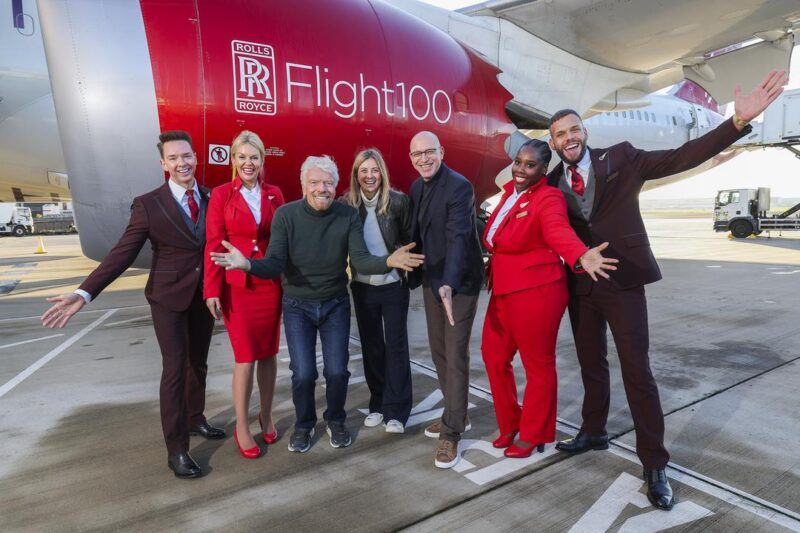
Great for a photo-op. But there’s a lot of work ahead.
We’ve recently seen demonstrations by Airbus, Boeing, and Emirates – amongst others, as well as other companies rating their engines to use SAF.
And that’s wonderful.
We’re at a point where the industry is seeing SAF as the “Hail Mary” to meet a lot of decarbonization/carbon-neutral targets. However, there are some nasties.
The article has pointed to a lack of SAF production, with the UK still fumbling if it decides to build any to support the industry, let alone announce how it intends to obtain the feedstock to generate the SAF.
Remember, Sustainable Air Fuel (by its definition) does not use food crops, prime agricultural land or freshwater in its production (compared to some other biofuels).
The cost of SAF is another thing that people never like to talk about, as SAF is a lot more than traditional kerosene – and whilst some airlines are currently eating the cost others (such as Air France) are putting levies on.
And SAF is but part of the picture – we’ve seen airlines choose to go for lighter seats and equipment on aircraft – whilst some bemoan the lack of padding, for airlines, its weight savings. That’s an important factor in how much fuel you will burn over the lifetime of an aircraft – be it Kerosene or SAF.
Whilst Virgin Atlantic says “If you make it, we’ll fly it”, there’s a long way to go – and a lot of motivation is needed to push the market forward.
Images, PA Media/Virgin Atlantic
Welcome to Economy Class and Beyond. Your no-nonsense guide to network news, honest reviews, in-depth coverage, unique research, as well as the humour and madness I only know how to deliver.
Our Social Media pool has expanded. You can find us across most networks as @economybeyond on Twitter, Mastodon, BlueSky, Threads and Instagram!
Also, remember that we are part of the BoardingArea community, bringing you the latest frequent flyer news from around the world.
